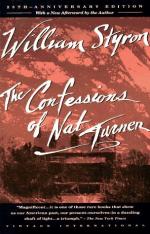|
This section contains 857 words (approx. 3 pages at 400 words per page) |

|
The Confessions of Nat Turner Summary & Study Guide Description
The Confessions of Nat Turner Summary & Study Guide includes comprehensive information and analysis to help you understand the book. This study guide contains the following sections:
This detailed literature summary also contains Related Titles and a Free Quiz on The Confessions of Nat Turner by William Styron.
The Confessions of Nat Turner tells the story of an actual slave uprising organized by a slave named Nat Turner in the year 1831. The author spent countless hours poring through historical documents to provide a framework for this fictional novel, in which William Styron attempts to imagine what kind of man Nat Turner really was. The book opens with Nat already captured and awaiting trial after the execution of his long-planned uprising. Nat spends his final days reviewing his life and the choices he has made.
In the early part of the book, Nat tells us about his younger years growing up on the Turner plantation. As a slave, Nat was given the last name of the family who owned his parents. His mother, Lou-Ann, was a house slave, which gave Nat a more privileged childhood than he would have had as a field slave. House slaves were permitted to eat their masters' table scraps -a much better diet than that of the field slaves - and although they worked long hours, their duties were usually not so physically exhausting as the intense labor endured by the field slaves. Nat's early years were relatively sheltered, and he didn't learn the harsher realities of slavery firsthand until later; he was even allowed to learn to read and write, and he became something like a household pet. As a child, Nat didn't understand the nature of his status in the household; he thought of himself, quite naturally, as a loved member of the family.
The literacy and carpentry skills that Nat gained in the Turner household would one day help make him a leader of his people; most black slaves were intentionally kept in an ignorant, illiterate state by their white masters. Nat, with his grade school grammar, was one of the most learned black men in the county. In later years, these skills would prove invaluable in helping Nat plan, organize, and execute a successful rebellion. He could read a map, make written notes of his plans, and make a numerical inventory of all of the firearms in the county available for the taking. He also had the advantage of having studied history, including the exploits of famous warriors such as Napoleon Bonaparte.
Although he learned the skills that would one day enable him to lead a rebellion early on, Nat did not begin planning one until years later. When he turned twenty-one, he was sold by the Turners to a Reverend Eppes, who later sold him to a man named Moore. Both Eppes and Moore used Nat as a field slave, ignoring his quick mind and ingenuity with carpentry tools. Nat's existence during this time was both physically and mentally unbearable, with too much physical labor and nothing to challenge his mind. The worst part, for Nat, was that he had never expected to live out his life as a slave. His master and erstwhile father figure, Samuel Turner, had promised to give Nat his freedom when he turned twenty-five. Turner betrayed this promise by selling Nat to Reverend Eppes but lied to Nat at the time of the sale, telling him that Eppes had signed a paper agreeing to free Nat in a few years. The realization that he'd been betrayed by Samuel Turner came gradually to Nat; his initial credulity turned to bitter disappointment as the years went by and Turner's promises proved to be lies.
Fortunately for Nat, the vicious Moore died, and Nat eventually wound up at the Travis residence, where the more kindly Master Travis was eager to put Nat's intelligence and skills to use. For Travis, Nat designed and built several highly ingenious contraptions, which increased Travis' financial wealth. Despite the improvement in his circumstances, though, Nat's misery grew deeper. No longer a naïve child, Nat could not hide from the injustices he saw perpetrated on his fellow slaves every day. Nat had long ago declared himself a Reverend, ordained by God in the church of nature. As a spiritual man, Nat began to see that he had an obligation, as one of the very few literate black men, to help his people.
Nat studied strategy, formed a plan for rebellion, and used his status as a preacher to convert other slaves to his cause. When the day came to execute his plan, Nat was determined to leave no survivors; he knew that in order to make an impact on the long-entrenched institution of slavery, the rebellion would have to be huge and bloody. Nat and his band of seventy-five followers succeeded in executing fifty-five white slave-owners - the largest insurrection of its kind in recorded history. Nat's success came at a steep price, though. In retaliation, the white militia killed over a hundred innocent black people, none of whom were involved in Nat's rebellion, and some of whom were not even slaves. Of the seventy-five slaves actually involved in the rebellion, about a dozen were returned to their masters, fifteen or so were sold down the river to hard labor and certain death, and seventeen, including Nat and his best friend Hark, were hanged.
Read more from the Study Guide
|
This section contains 857 words (approx. 3 pages at 400 words per page) |

|



